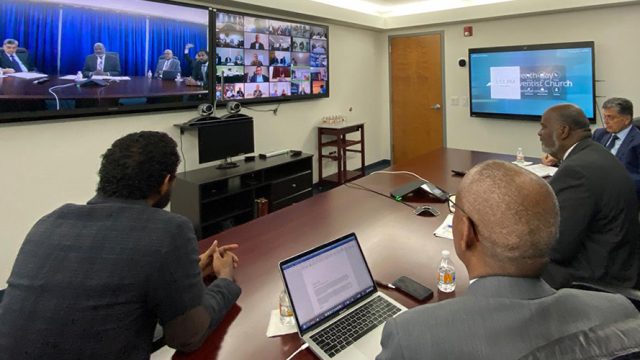It dawned on me that I had been looking at the poster for the whole semester. Yet somewhere in the back of my […]

It dawned on me that I had been looking at the poster for the whole semester. Yet somewhere in the back of my mind was always a nagging question about the validity of its message. Campus had been plastered all over with the poster (even in the bathrooms!), and it was hard to miss.
Across its top one could read in bold letters: “When Failure Is NOT an Option.” There were, of course, lots of other posters surrounding it that vied for my attention. Consequently, I had never really read it completely, but somehow the message had subliminally struck home. Eventually I decided to read the whole thing, which turned out to be an encouraging invitation of the university’s Disability Support Services, directed at struggling students to overcome their limitations and succeed. Excellent! So far, so good!
Nevertheless, I’m still confounded by the initial message. Not, of course, in connection with struggling students, but with an achievement-obsessed society we live in, which has made success the ultimate goal in life, and clearly does not tolerate failure. I recall talking to a friend about raising teenagers (we have two at home); during the conversation she turned to me and said that the worst thing for her daughter was the thought that she might fail at something. Grades in school, sports, even Pathfinders, and dating—we have to succeed at everything, often at great emotional expense.
The Psychological and Sociological Angle
A recent study conducted in Germany showed that every seventh learner is sent for extra tutoring by their parents, although their grades are quite good, adding hours and hours of extra afternoon classes to an already-overfull schedule. Behind this are not necessarily failing students, but parents who like to see their children succeed—and only succeed. What the child learns is not necessarily more algebra and grammar, but the idea that “I have to continuously be bringing home excellent results, and if I can’t, I need help. Serious help, because otherwise I will endanger my academic and, eventually, social progress. And progress there must be; consequently: ‘I must not fail.’ ”
Child psychologists have raised the alarm and speak of depression and anxiety, even burnout, at an increasingly younger age.1 They suggest that part of the problem is that children are not learning to fail, and thus are failing to learn from their failures. In addition, a society that does not tolerate failures further contributes to the spiral of better and best. This leaves an enormous amount of insecurity and self-doubt in its wake. Then, when life happens with all its inevitable failures and likely disappointments, we are utterly unprepared for it.
This is certainly not a call for mediocraty and discouragement of any striving for excellence. Rather, it’s an invitation to reflect if it’s not time to jump off the bandwagon of better and best, looking for a healthier way to learn and master life, even eternal life.
The Theological Angle
The Bible is full of people who failed: there is a Moses who strikes first the Egyptian, and later the rock one too many times; remember David, who fails royally (pun intended) to control his desires toward a beautiful but married woman; there is Peter, who fails to leave the sword in the sheath and curses unspoken; and Paul, who fiercely persecutes the early followers of Jesus, only to see the complete failure of his entire previous life when Christ Himself confronts him on the road to Damascus. The list could go on and on! As a matter of fact, it was exactly their failures that eventually drove them right into the arms of a forgiving and loving Savior and turned them into powerful heroes of faith. Along the way they learned two fundamentally important things.
First, when I fail, I realize that I need to trust less in my own achievements and more in the power of God’s grace: “But he said to me, ‘My grace is sufficient for you, for my power is made perfect in weakness.’ Therefore I will boast all the more gladly of my weaknesses, so that the power of Christ may rest upon me” (2 Cor. 12:9, ESV).2 Failure is a step toward forgiveness and strength in Christ. On the contrary, when failure is not an option, I might find myself on the side of a distorted perfectionist image of God’s righteousness.
Second, when I fail, there is a chance that I will become more compassionate with the people around me. In looking back on Peter’s experience, Ellen White comments: “Remembering his own weakness and failure, he was to deal with the sheep and lambs committed to his care as tenderly as Christ had dealt with him.”3 A healthy recognition of our own failures makes us more forgiving of the shortcomings of others and helps us develop Christlike empathy.
So failure is unfortunately but definitely an option in a sin-stricken world. It’s not an option I would necessarily look for or strive for voluntarily, but it’s an option that I know sooner or later will come my way. And that’s OK! I don’t have to pressure myself into constant success, falling apart at the first failure. Similarly, I recognize that I do not have to pressure my children into being overachievers. They should know that they are allowed to fail, that they can grow by learning from their mistakes; and that divine grace provides for all of that. I pray I’ll still say the same when the next grade report comes home.
1 http://www.spiegel.de/lebenundlernen/schule/burnout-bei-kindern-wie-kommt-es-so-frueh-zu-depressionen-a-1045734.html.
2 Scripture quotations marked ESV are from The Holy Bible, English Standard Version, copyright © 2001 by Crossway Bibles, a division of Good News Publishers. Used by permission. All rights reserved.
3 Ellen G. White, The Acts of the Apostles (Mountain View, Calif.: Pacific Press Pub. Assn., 1911), p. 516.
Martin G. Klingbeil, D.Litt., is professor of biblical studies and archaeology and associate director of the Institute of Archaeology at Southern Adventist University in Collegedale, Tennessee, United States.







